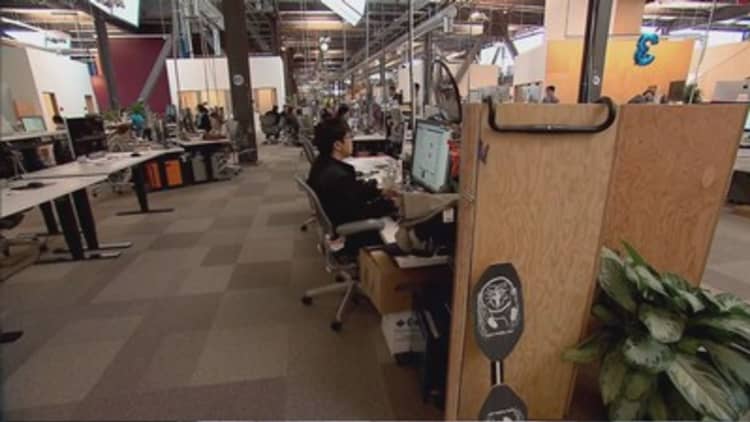
With the job market getting more competitive, some employers are betting on a new benefit that actually matters to most people, especially millennials.
Beginning in January, companies including PwC and Natixis Global Asset Management will offer a student loan repayment program to its employees, and other businesses will follow.
The aim is to attract young, top talent by tackling the issue that hits them hard in their wallets.
Student debt weighs heavily on graduates' plans, including saving for retirement, buying a house, getting married and even having children.
It's a problem that has reached record levels in this country, with nearly $1.3 trillion in student loans outstanding. On average, student borrowers who graduated this year owe more than $35,051, according to Mark Kantrowitz, a student financial-aid policy expert and publisher of Edvisors.com.
Boston-based Natixis announced Tuesday that the company will contribute up to $10,000 to every full-time employee who has outstanding Federal Stafford or Perkins Loans.
The financial services firm's 2015 study of retirement-plan participants found that 35 percent of millennials who do not contribute to a company-sponsored retirement plan cite the need to pay off student loans as a factor.
But "it's not just a millennial problem," said Ed Farrington, senior vice president of business development and retirement at Natixis. "There are quite a bit of people in their 40s, 50s and 60s who have student loan debt. What are we hoping comes of this is alleviating the stress around this debt burden and I think that will resonate quite well."
The benefit will consist of one $5,000 cash payment to employees after five years at the company, followed by annual payments of $1,000 distributed over the next five years. The number of participants is yet unknown, Farrington said.
PwC said earlier this fall that starting in January, it will pay up to $10,000 in student debt for associates and senior associates with one to six years of work experience, made as direct payments of $1,200 a year.
"As a firm that recruits more than 11,000 new hires off campus each year, this is an opportunity to differentiate ourselves with a key talent group — millennials — and provide a meaningful way to help reduce their debt," Tom Codd, vice chairman and U.S. human capital leader at PwC, said in a statement.
PwC's new student loan repayment plan will be implemented by Gradifi Inc., a Boston-based start-up. Over 100 other companies are signed up to launch similar plans next year, according to Gradifi founder and CEO Tim DeMello.
Only 3 percent of U.S. employers now offer company-provided student loan repayment, according to the Society of Human Resources' 2015 SHRM Employee Benefits survey. Next year will be a different story, said Bruce Elliott, the organization's manager of compensation and benefits.
"These companies are the canaries of the coal mine," he said. Elliott predicts this benefit is going to be extremely attractive to recent grads. "When you are making $40,000 to $50,000 a year, it could be the difference between making rent," he said. "A 401(k) match is great but they've got 40 to 45 years before they retire."
"It's only going to grow in popularity," said Andrew Josuweit, CEO and president of Student Loan Hero, a student-loan management site. "Millennials don't care about 401(k)s and realistically they shouldn't," he said. "Our advice is, let's kill your student loans as fast as possible, then focus on building a retirement account."
However, complications may arise as more employers jump on the bandwagon. Trying to determine who should be eligible is a challenge in itself. If one employee has multiple loans from different servicers, which loans get paid down first — the one with the lowest balance loan or the loan with the highest interest rate? Josuweit asked. "The devil is in the details, and that's where it gets tricky."



